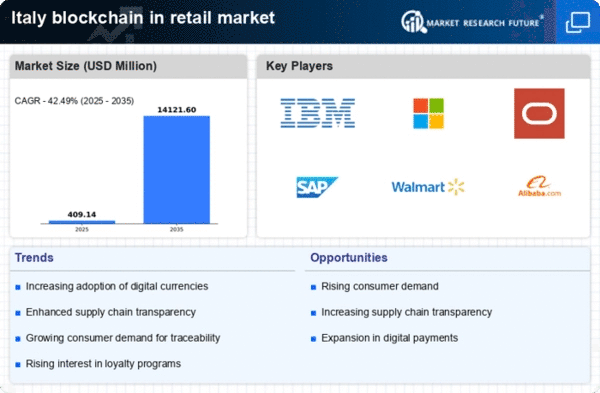Increased Consumer Demand for Authenticity
The blockchain in-retail market is experiencing a notable surge in consumer demand for authenticity and transparency in product sourcing. Italian consumers are increasingly concerned about the origins of their purchases, particularly in sectors such as food and luxury goods. This trend is evidenced by a 30% increase in consumer willingness to pay a premium for products verified through blockchain technology. Retailers are thus compelled to adopt blockchain solutions to enhance traceability, ensuring that products meet quality standards and ethical sourcing practices. This shift not only builds consumer trust but also positions retailers favorably in a competitive market, as authenticity becomes a key differentiator in consumer purchasing decisions.
Enhanced Data Security and Fraud Prevention
In the blockchain in-retail market, enhanced data security is emerging as a critical driver. Retailers face growing threats from cyberattacks and fraud, which can undermine consumer trust and lead to substantial financial losses. Blockchain technology offers a decentralized and immutable ledger, significantly reducing the risk of data breaches. In Italy, the retail sector has reported a 15% increase in incidents of fraud, prompting retailers to seek robust solutions. By implementing blockchain, retailers can safeguard sensitive customer information and transaction data, thereby enhancing consumer confidence and loyalty. This focus on security is likely to become a cornerstone of retail strategies moving forward.
Cost Reduction through Operational Efficiency
The blockchain in-retail market is poised to benefit from significant cost reductions driven by enhanced operational efficiency. By streamlining processes such as inventory management and payment systems, retailers can reduce overhead costs by an estimated 20%. Blockchain technology facilitates real-time data sharing among stakeholders, minimizing delays and errors associated with traditional systems. This efficiency not only lowers operational costs but also improves the overall customer experience, as transactions become faster and more reliable. As Italian retailers increasingly recognize these benefits, the adoption of blockchain solutions is likely to accelerate, further transforming the retail landscape.
Sustainability Initiatives and Eco-Friendly Practices
The blockchain in-retail market is increasingly aligned with sustainability initiatives, as consumers demand eco-friendly practices from retailers. In Italy, a significant 40% of consumers express a preference for brands that demonstrate environmental responsibility. Blockchain technology enables retailers to track and verify sustainable practices throughout their supply chains, from sourcing to delivery. This transparency not only appeals to environmentally conscious consumers but also helps retailers comply with stringent regulations regarding sustainability. As the focus on eco-friendly practices intensifies, the integration of blockchain solutions is likely to play a pivotal role in shaping the future of retail in Italy.
Integration of Smart Contracts for Streamlined Transactions
The blockchain in-retail market is increasingly leveraging smart contracts to facilitate streamlined transactions. These self-executing contracts automatically enforce and execute terms based on predefined conditions, reducing the need for intermediaries. In Italy, the adoption of smart contracts is projected to grow by 25% over the next few years, as retailers seek to enhance transaction efficiency and reduce costs. This technology not only accelerates payment processes but also minimizes disputes, as all parties have access to the same immutable data. As retailers embrace this innovation, the potential for improved operational workflows and customer satisfaction becomes evident.
















